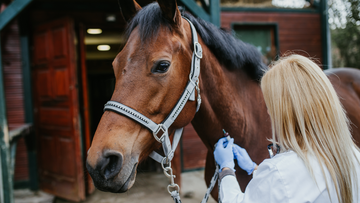Most horse owners have heard of Coggins tests many times. But how many can truly explain what it is and why it’s so important? Although we hear the term often, many people don’t fully understand its purpose. A Coggins test is a blood test used to detect Equine Infectious Anemia (EIA), which is a highly contagious and potentially fatal disease with no cure or vaccine. EIA spreads through biting insects and contaminated equipment, making regular testing essential to protect not only your horse but also the entire equine community.
What Is a Coggins Test?

Coggins tests detect the presence of Equine Infectious Anemia (EIA), also known as swamp fever. EIA is an infectious viral disease that is transmitted by insects such as horseflies and deerflies. The disease can also spread through contaminated surgical equipment, recycled needles, syringes, and even bits. Mares can also transmit the disease to their foals. Coggins tests are done with a simple blood draw and test from your veterinarian. The text results come back within a week in most areas.
Why Is the Coggins Test Important?
EIA can cause fever, weight loss, icterus (yellowing of body tissues), anemia, swelling in the limbs, and weakness. It does not have a cure and can be fatal. Some infected horses become lifelong carriers without showing symptoms, making regular testing crucial for identifying and controlling the disease. Most states require a negative Coggins test before a horse can travel, be sold, or participate in events. Without a negative test, horse owners may face legal penalties or be denied entry to competitions, trail rides, or boarding facilities.
When Do You Need a Coggins Test?
In most states, a negative Coggins test within 12 months is required to transport a horse from one location to another. Some states require a negative test within 6 months. Traveling between states usually requires a negative Coggins test within 6 months and a veterinarian-signed health certificate. You should always check the state regulations or ask your vet, as some regions enforce stricter rules to prevent the spread of EIA. Even if your horse rarely leaves the property, routine testing is still recommended. A visiting horse, a shared water source, or a stray bite from an infected fly could put your horse at risk.
The Importance of Regular Testing
After testing, your veterinarian will provide you with either a negative or positive result. A negative Coggins test means no EIA antibodies were detected, allowing your horse to legally travel, compete, or be sold without restrictions. However, a positive result is serious. EIA-positive horses must be permanently quarantined or humanely euthanized, as required by U.S. regulations.
Since there is no treatment for EIA, prevention is the only way to control the disease. Regular testing ensures early detection, protects your horse, and helps prevent outbreaks. If your horse is due for a Coggins test, don’t delay—schedule an appointment with your veterinarian today to stay compliant and keep your equine companions safe.
For more information on Coggins tests, visit Veterinary Partner – Coggins Testing.






















